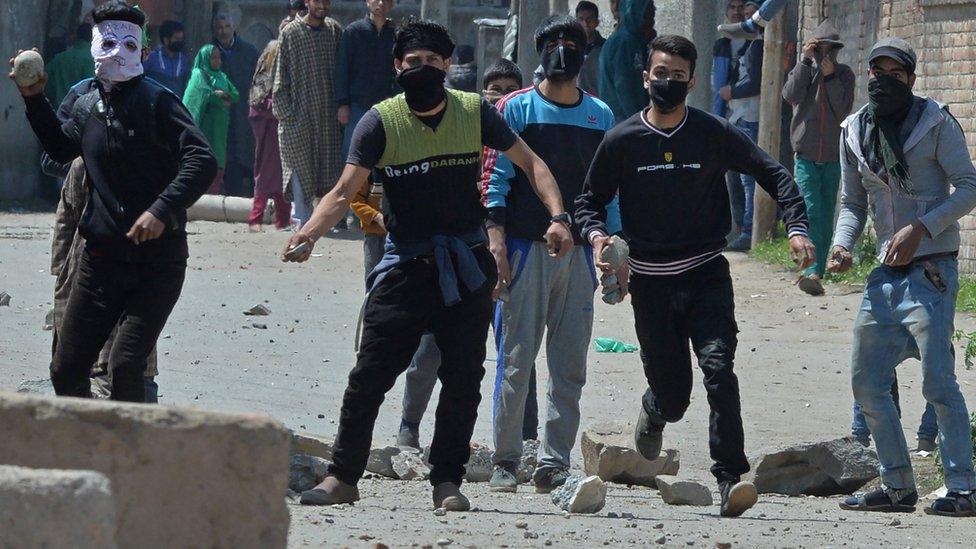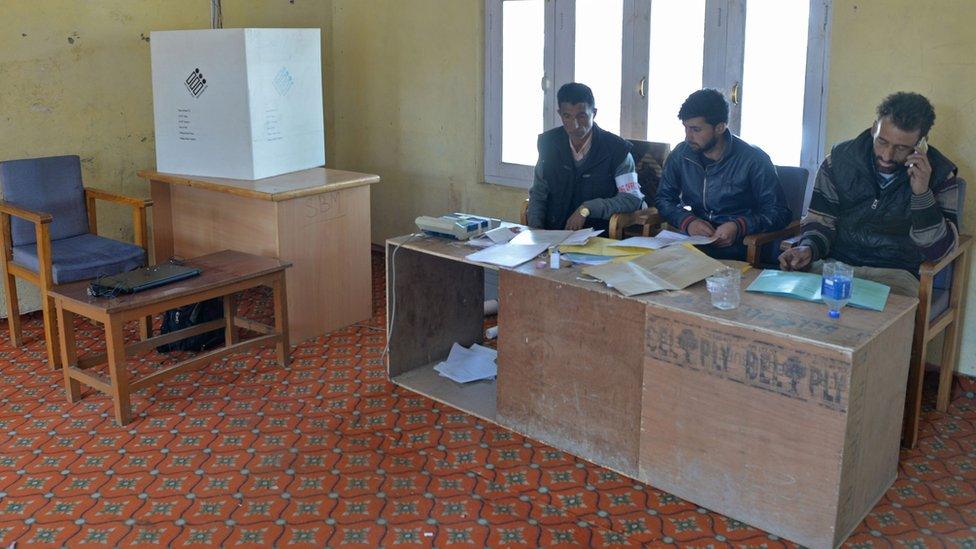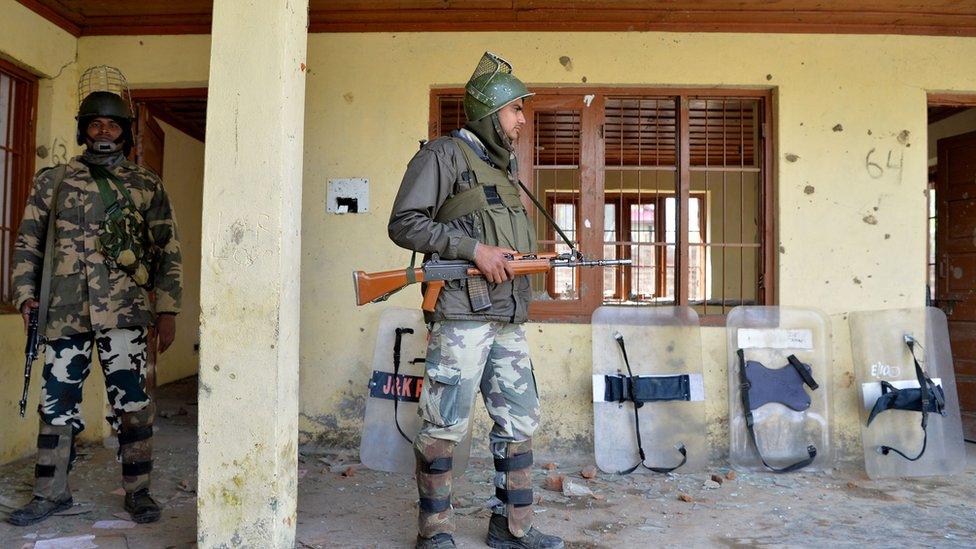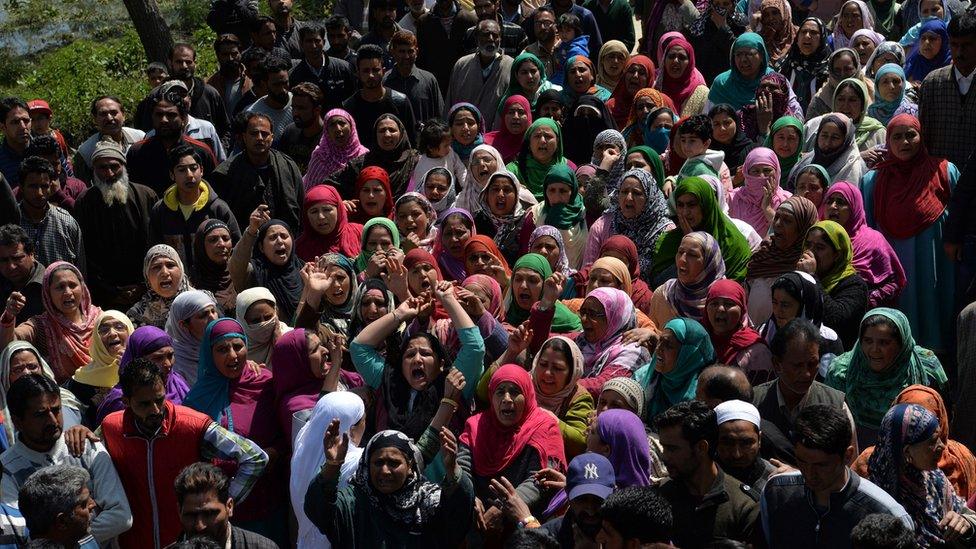The election where no-one came to vote
- Published

Protesters have been attacking polling centres in Indian-administered Kashmir
Eight people died and more than 100 were injured in Indian-administered Kashmir in a highly contentious by-election over the weekend. Separatist leaders called for voters to boycott the polls and protestors attacked more than 150 polling centres.
On Thursday India attempted to re-run the disrupted ballots. There was massive security in place.
But an election without voters is a very sad affair.
I arrived at one polling station five hours after it had opened. Not one ballot had been cast.
The eyes of seven bored election officers looked up expectantly as I walked in.
It was a sorry scene. The windows were broken but no-one had bothered to sweep up the puddles of broken glass on the floor.
On Sunday, protesters had stormed the building, pelting stones. The polling centres was forced to close, hence the ballot today.
I introduced myself and asked how things were going.
"We're hatching eggs here," laughed Ali Mohammad, one of the election officers. He meant they were sitting doing nothing.

Polling booths remained empty despite government efforts to conduct elections again
When I asked why it was so quiet, he conceded that India's efforts to ensure there was no disruption this time round might well have put some voters off.
Kashmir is one of the most militarised region in the world - there are more personnel per capita here than in Iraq or Syria. We'd driven through streets lined with heavily armed officers to get here - one for every three eligible voters.
"Area domination", the policeman in-charge called it, seemingly unconscious of how ominous his words sounded in a region many believe is on the brink of separatist revolt.
But back at the polling station, Mr Mohammad didn't think military muscle alone accounted for the lack of interest in the electoral process.
Will it get any busier, I asked? He shook his head. "We are ready for voters if they come, but it won't be busy here today," he told me, smiling gently.
Then he frowned, clearly unhappy with his fellow Kashmiris' lack of engagement. Mr Mohammad is a teacher by profession.
"The right to vote is important," he said after a pause, "it gives us the power to determine our own fate."

Kashmir is one of the most militarised places in the world
His words underscore just what an indictment of the mainstream Kashmiri parties the turnout on Sunday was when only 7% of the electorate bothered to vote.
Yes, separatists called for a boycott and yes, there were stone-throwing mobs at some polling stations, but if the electorate had been persuaded that politicians could deliver a brighter future, more would surely have made the effort to vote.
That was certainly the view of the group of young men I got talking to outside another of the polling centres that had been attacked.
When I asked how many of them had been part of the stone-throwing mob, they shuffled nervously. Then 13, 14, 15 hands went up: half the group.
The justification was all too familiar - "azadi" or freedom.
Kashmiris have long dreamt of creating an independent nation up here in the bright green valleys of the Himalayas. It's an ambition India has no intention of allowing.
In the 80s and 90s, a few thousand militants were at the vanguard of the independence struggle. There are far fewer now - perhaps 250 or so - but opposition to Indian rule appears to be becoming more widespread.
It is the reason the young men give for trying to disrupt the polls. "All politicians are the same and none of them will bring freedom, so why vote?" asked one.

Kashmiri people say their only option is to fight Indian rule in the state
But what is the alternative?
The answer these young men gave doesn't augur well for Kashmir - or for India. They said they wanted to fight.
"When you suffer atrocity after atrocity you lose all fear. We aren't scared of anything now," claimed Aijaz Amin, his long eyebrows fluttering nervously.
He said he had never been involved in violence but he used an ominous Urdu phrase. The direct translation is, "We have shrouds over our heads." It means they will do anything to get what we want, and it implies a fight to the death.
By late afternoon I had arrived at one of the most notorious villages in the constituency. Once again, no votes had been cast but, with a sickening inevitability, hundreds of young men came out to throw stones at the security forces.
The battle that followed had a ritual quality. These riots are repeated virtually every week here in Kashmir.
And it all ended promptly at 4pm, when the polls closed. The last officers fired off a volley of shotgun rounds into the crowd, before leaping into their armoured vehicles and driving rapidly away.
A couple of hours later the Kashmir Election Commission released the figures for the day's ballot.
Just 709 people had voted, a 2% turnout.